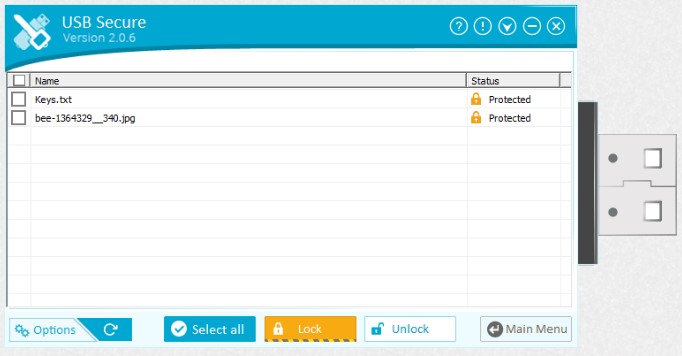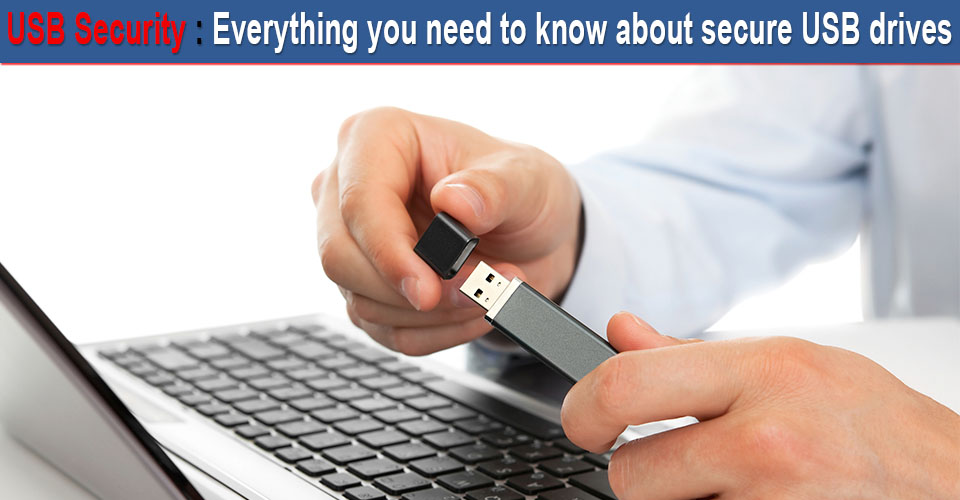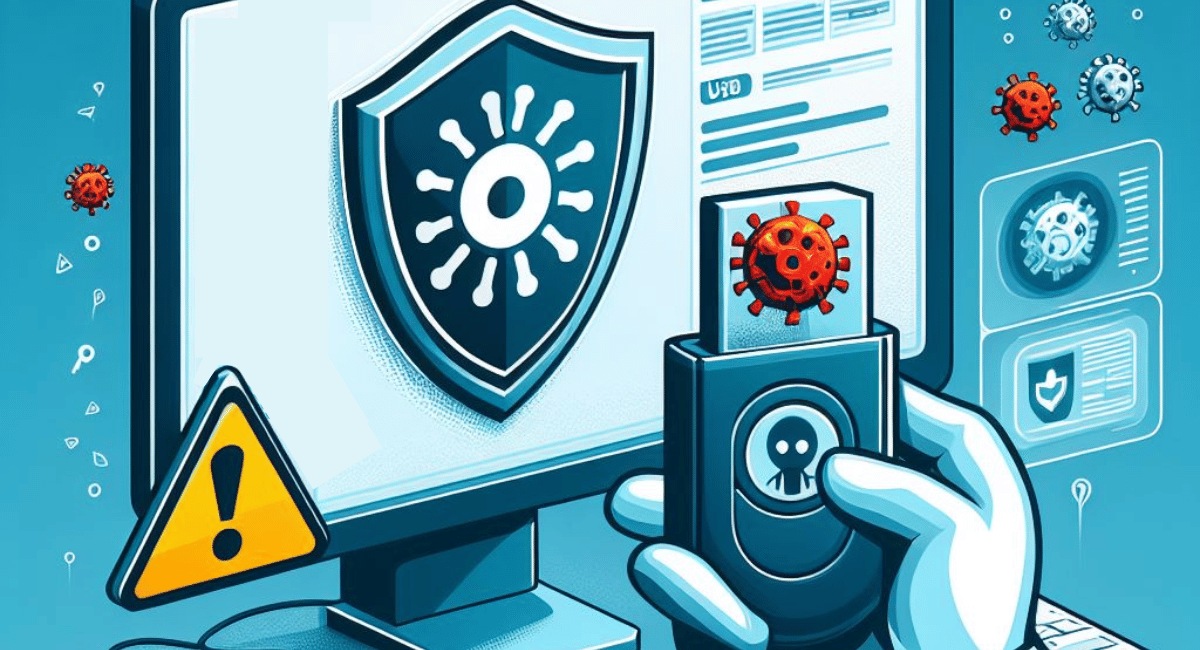Many of you may have used USB flash drives at one point in your life, or you are an avid user of USB drives. However, few of you may not know about USB security or the concept of a secure USB. This article will discuss the various reasons why you need USB security and how a secure USB can prevent leaks of critical data – which could lead to devastating results.
Here are some real life examples of what happens when you use a USB drive without applying USB security on it. You are a chef who likes to save all your recipes in an external drive, your recipes are what has lead you towards a successful businessperson in the domain of fine dining. However, given your limited knowledge on USB security you fail to password protect your external drive with software designed to secure USB. Accordingly, since there is no USB security applied on your external drive, given that you could of easily password protected your external drive with software designed to secure USB drives. Accordingly, your head chef discovers this loopholes and he conveniently steals your external drive and transfers all the data to his computer, he then deletes those files from your external drive. Had you used a UBS security software to safeguard your drive, your head chef wouldn’t be able to get through as your drive would be protected with a software designed to USB secure.
Let’s look at another example, you are busy sales executive who often works on solid customer leads, accordingly, every day, you take your data home with you on a USB drive, though you have no concept of keeping it password protected with a USB security software which can secure USB drives. Accordingly, one day, while going home on the bus, you end up dropping your flash drive. Someone picks it up, and it just so happens, this person is a criminal who finds that the data on your USB drive is quite valuable. Accordingly, he arranges a way to sell your sensitive information to potential competitors. Likewise, he exchanges this information for a hefty sum on the internet’s black market. Had you used a USB Security software, specifically develop to secure USB flash drives, your data wouldn’t have been inaccessible to this criminal. Sadly, this wasn’t the case, and you end up losing your job and career as result of your carelessness.

Flash Drive Security:
The above two paragraphs are an excellent example that shows how a simple failure to secure USB drives with a USB security software can end up costing someone a lot of grief and regret. However, not all USB security software are created equal. One of the most trusted and highly rated software designed to password protect and secure USB drives is USB Secure. USB secure is a dynamic USB security software which can be installed on any external drive. It is a software that costs a few dollars but can end up saving you thousands or even millions in lost data.
USB Flash Drives A Security Risk
USB flash drives can be a security risk if they are not properly secured. If a USB flash drive is not password-protected and encrypted, it can be a target for malicious actors to access and steal sensitive data. Additionally, USB flash drives can also be used to spread malicious software and viruses. It is important to make sure that USB flash drives are properly secured and encrypted to reduce the risk of security breaches.
Duration Of Data Safe On A Flash Drive
Data stored on a USB flash drive is generally safe as long as it is properly stored and maintained. If the drive is stored in a safe and secure place, the data should remain safe indefinitely. However, if the drive is exposed to extreme temperatures or physical damage, the data may become corrupted or lost. Additionally, USB flash drives should be regularly backed up to ensure that the data is not lost in case of an emergency.
How Many Times Can A USB Flash Drive Be Used?

The number of times a USB flash drive can be used depends on the type of flash drive and the amount of data stored on it. Generally, flash drives are designed to last for several hundred uses, but this can vary depending on the type of drive and the amount of data stored on it. It is important to note that the more data stored on a drive, the more likely it is to become corrupted or damaged over time.
Which Lasts Longer SSD Or HDD?
SSDs typically last longer than HDDs. SSDs are more reliable, faster, and use less power than HDDs. SSDs also have no moving parts, which makes them more resistant to physical damage and data loss. They are also more durable and have a longer lifespan than HDDs.
Which Is Better Flash Drive Or SSD?
Flash drives are typically better for short-term storage, while SSDs are better for long-term storage. Flash drives are generally less expensive and faster than SSDs, but they are also less reliable and have a limited capacity. SSDs, on the other hand, are more reliable, faster, and have a much larger capacity.
Safely Scan USB Drive
The best way to safely scan a USB drive is to use a reliable antivirus program. Before connecting the USB drive to your computer, make sure to scan it with your antivirus program. This will ensure that any malicious software on the drive is detected and removed. Additionally, you should make sure to keep your antivirus program up-to-date and always run regular scans to ensure that your system is secure.
Can A Magnet Erase A USB Drive
Yes, a magnet can erase a USB drive. Magnets can cause the data stored on a USB drive to become corrupted and unreadable. To prevent this from happening, it is important to keep USB drives away from magnets and other sources of strong magnetic fields.
Remove Virus From My USB

The best way to remove a virus from your USB is to use an antivirus program. Most antivirus programs will detect and remove malicious files and programs from your USB drive. Additionally, it is important to keep your antivirus program up-to-date and run regular scans to ensure that your system is secure. Additionally, you should avoid downloading files from untrusted sources and always scan any files you download before opening them.
Decrypt A USB
Yes, you can decrypt a USB drive. There are a few different ways to do this, depending on the encryption method used. If the USB drive is encrypted with a password, you can use a password recovery tool to decrypt the drive. Alternatively, you can use a specialized software program to decrypt the drive. Finally, you can also use a hardware-based encryption device to decrypt the drive.
How Safe Are Encrypted USB Drives?
Encrypted USB drives are generally very safe, as long as you use a strong encryption algorithm and a secure password. The encryption algorithm used should be a military-grade algorithm, such as AES-256. Additionally, the password used should be strong and not easily guessed. If these two measures are taken, then the data stored on the USB drive should remain secure and inaccessible to unauthorized users.
The Most Secure Drive
The most secure drive depends on the type of data you are trying to protect and the level of security you need. Generally, the most secure drives are those that use military-grade encryption algorithms, such as AES-256, and have a secure password. Additionally, the drive should use hardware-based encryption, as this makes it more difficult for hackers to gain access to the data.
Safest Place To Save Files
The safest place to save files is on a secure cloud storage system or on an external hard drive that is encrypted with a strong password. Cloud storage systems are typically more secure than local storage systems, as they are managed by a third-party provider that is responsible for ensuring the security of the data. Additionally, using an external hard drive with encryption ensures that the data is kept safe from unauthorized access.
Is Google Drive Easily Hacked?
No, Google Drive is not easily hacked. Google Drive is a secure cloud storage system that uses encryption and two-factor authentication to protect user data. Additionally, Google has implemented a variety of security measures to ensure the safety of user data, such as regular security audits and data loss prevention measures.
Virus Spread To A USB Drive
Yes, a virus can spread to a USB drive. USB drives are vulnerable to malware, as they are small, portable devices that can be easily carried from one computer to another. To prevent the spread of a virus, it is important to ensure that the USB drive is scanned for viruses before being used on any computer. Additionally, it is important to ensure that the USB drive is kept up to date with the latest security patches.
Disadvantage Of Encrypting A Drive
One disadvantage of encrypting a drive is that it can reduce the performance of the computer. When a drive is encrypted, the computer must spend more time and resources decrypting and encrypting data, which can slow down the computer’s performance. Additionally, encryption can also make it more difficult to access the data stored on the drive, as the user must remember the password or key used to encrypt the drive.
Weakness Of Encryption
A weakness of encryption is that it is vulnerable to brute-force attacks, in which an attacker attempts to guess the encryption key by trying every possible combination. Additionally, encryption is vulnerable to attacks that exploit weaknesses in the encryption algorithm or implementation, such as known-plaintext attacks or side-channel attacks. Finally, if the encryption key is lost or forgotten, the encrypted data cannot be recovered.
Encrypted Drive Safe From Ransomware
No, an encrypted drive is not necessarily safe from ransomware. While encryption can make it more difficult for ransomware to access or modify data, if the encryption key is known to the attacker, they can still encrypt the data. Additionally, ransomware can still encrypt unencrypted data on the drive, and the user may be unable to access it until the ransom is paid.
Is It Safe To Encrypt SSD
Yes, it is safe to encrypt an SSD. Encryption can help protect data stored on an SSD from unauthorized access, and it can also help ensure data integrity. Additionally, encryption can help improve the performance of an SSD, as the encryption process can be handled by the drive’s controller rather than the CPU.
Security Found On Some Flash Drives
Some flash drives offer hardware encryption, which provides an extra layer of security by encrypting the data stored on the drive. Additionally, some flash drives may also offer password protection, which requires the user to enter a password before the drive can be accessed. Other security measures that may be available include biometric authentication, which requires the user to provide a fingerprint or other biometric data in order to access the drive.
Secure My USB Ports
To secure your USB ports, you should use a USB port lock or USB port blocker. A USB port lock is a physical device that is inserted into the USB port and prevents unauthorized users from accessing the port. A USB port blocker is software that is installed on the computer and blocks access to the USB port until the user provides the correct password. Additionally, you can also use an antivirus program to scan your USB ports for malicious software.
Setup A USB Security
Setting up a USB security system involves a few steps. First, you need to install a USB port lock or blocker. This will prevent unauthorized users from accessing the port. Second, you should install an antivirus program to scan your USB ports for malicious software. Finally, you should configure your security settings to prevent unauthorized access to your USB ports. This can include setting up a password-protected access or setting up a whitelist of authorized devices.
Things Destroys A Flash Drive
Flash drives can be destroyed by physical damage, such as dropping them on a hard surface, or by exposure to extreme temperatures. Flash drives can also be destroyed by exposure to water, as the components inside can be damaged by moisture. Additionally, flash drives can be corrupted by viruses or malware, which can cause data to be lost or inaccessible.
Function Of USB Disk Security
USB disk security is a type of software that is designed to protect USB storage devices from unauthorized access. It can be used to block access to a USB device, encrypt the data stored on it, or restrict the types of files that can be stored on it. It can also be used to detect and prevent malicious software from being installed on the device.
Can USB Drive Be Hacked?
Yes, USB drives can be hacked. USB drives are vulnerable to malware and viruses, which can be used to access the data stored on the drive. Additionally, USB drives can be physically accessed and manipulated, allowing an attacker to gain access to the data stored on the drive.
Way To Know If Someone Accessed USB Drive
There are several ways to tell if someone has accessed your USB drive. You may notice that files have been moved or deleted, or that new files have been added. Additionally, if the drive has been connected to a computer, you may notice changes in the files stored on the drive. Finally, if the drive has been connected to a malicious computer, you may notice that the drive is running slower than usual, or that it is displaying unexpected errors.
Stop Someone From Using USB Storage Device
To prevent someone from using your USB storage device, you should password protect it. Most USB drives have a built-in feature that allows you to set a password for the device. You can also encrypt the data stored on the device to make it more secure. Additionally, you should avoid connecting the device to public computers, as this may make it easier for someone to access the data stored on it.
